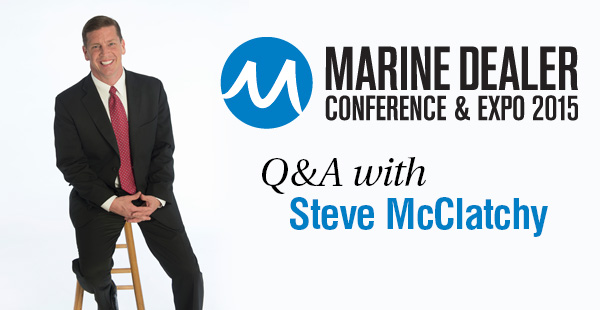Q&A with MDCE opening keynote speaker Steve McClatchy

Steve McClatchy is a keynote speaker, workshop leader and author of the New York Times Bestseller Decide: Work Smarter, Reduce Your Stress & Lead by Example. His firm focuses on helping companies and individuals improve performance and achieve outstanding results in a multitude of areas.
Steve has spoken before thousands of audiences on the topics of work/life balance, goal achievement and personal leadership. His client list includes the NFL, Pfizer, Microsoft, Disney, Comcast, HP, Ikea, Wells Fargo and more.
Attendees of the 2015 Marine Dealer Conference & Expo will have a chance to experience Steve’s speaking prowess firsthand. We caught up with Steve ahead of his keynote to share some of his insights and what attendees can expect from his keynote.
Depending on your preferred method of inspiration, you can also find Steve on Twitter at @stevemcclatchy, on YouTube at youtube.com/user/AlleerTraining and on LinkedIn at linkedin.com/in/stevemcclatchy for further ideas and insights. Early registrants of the 2015 Marine Dealer Conference & Expo already received an advance copy of Decide, but you can buy it now at Amazon, Barnes & Noble, Indiebound and 800ceoread. You can also read more at alleer.com.
Can you talk about what you plan to cover in your opening keynote at the Marine Dealer Conference & Expo?
The topic is decision-making and the psychology behind the decisions that we make each day. … Maintenance decisions have characteristics to them. Typically the task has a deadline, there’s urgency involved, there’s consequences you face if you don’t do it, these tasks typically repeat over and over again. And then in the improvement bucket, these tasks don’t have a deadline. They’re very easily pushed off into the future. There are no consequences if you don’t do them – there are only benefits if you do them. Take, for example, running a marathon, writing a book, getting an MBA.
What do you hope attendees walk away with from the keynote?
What I’m trying to help people to do is balance their life between maintenance and improvement. There’s so many myths and misconceptions about the topic of balance … and really what creates the feeling we all call balance is improvement, because improvement, if it really does make your life better, creates excitement. … Balance is maintenance and improvement together, and you’re excited and you’re engaged in your life. If there’s not enough time to improve things, how do you do it? So I go through every time we work on our lives – when you set a goal or you learn something new or you achieve a goal – we schedule it, we defend it and then we play catch up with maintenance after it. … When we do the things we want to do in life, we fall behind on the things we have to do. But as long as those things get us excited, then playing catch up is easy.
Can you talk a little bit about how the three levels of leadership – the personal, the interpersonal and the business – all work together to help an individual become an effective leader?
I try to keep the audience focused on the three levels of our life: our personal life, our relationships and our business. There is the maintenance of those things and there is the improvement of those three things, and how does a leader do both? I go through the decision-making process that’s involved in balancing those two categories. … What is improvement for you personally? What relationships do you have that need an investment [and] improvement? Which relationships do you need to work on? … When do you apply it to working on your business?
What is the difference between leading and managing?
I turn leadership into a result you produce. … It calls us all to action. The minute you stop improving things, you’re a manager. … [Leadership] is not title, not position, not personality, it’s not about servant leadership, it’s not about situational leadership, it’s not about a self-aware leader. Those things are all tools in your toolbox to make things better, but leaders improve things. It’s about the result and the outcome, and when you’re using servant leadership and you’re using situational leadership to make things better, that’s leadership.
How can attendees start practicing these great decision-making habits today?
Pull out their calendar and schedule something that gets them excited! Trying to get improvement into your day today is very difficult. Trying to get improvement in November is easy. … The calendar is what runs all improvement and when you try to put improvement in today with willpower, discipline and motivation, it will last about a week. But the calendar brings structure to our decision-making. … Having things you’re excited about makes all the work worth it.




